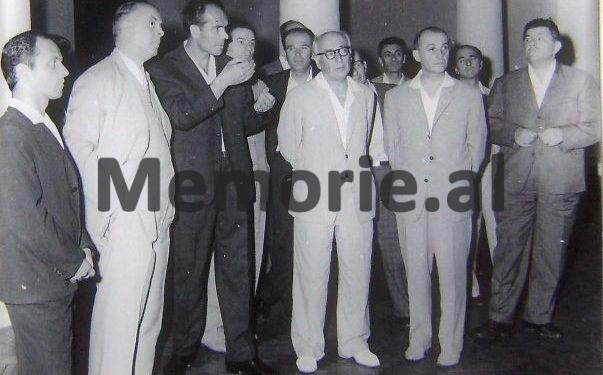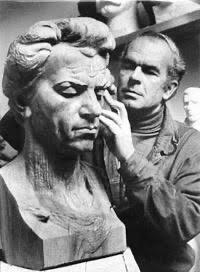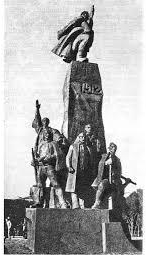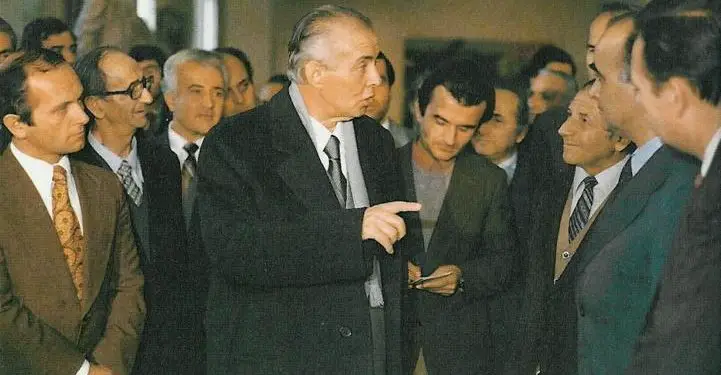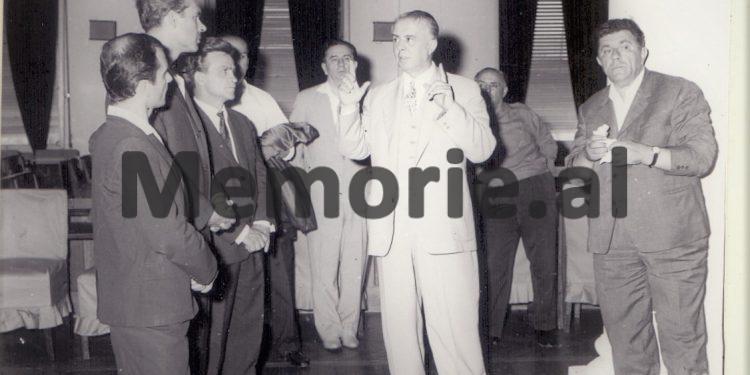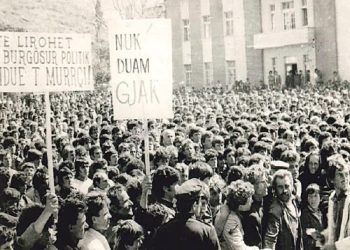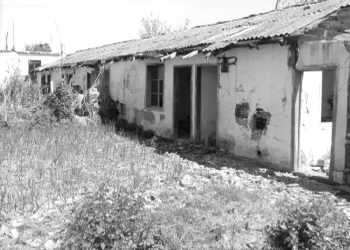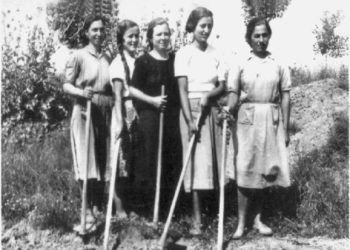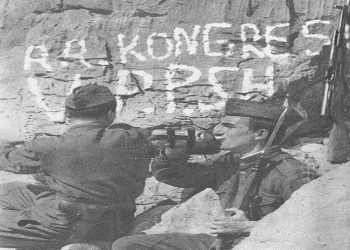Dashnor Kaloçi
Memorie.al publishes an unknown archival document issued from the Central State Archive in Tirana (fund of the former Central Committee of the ALP), which contains the minutes of a meeting of the Politburo of the Central Committee, held on April 14, 1969, where the leader of communist Albania, dictator Enver Hoxha, after talking about foreign and Albanian literature, mentioning the books of these authors he had read, he discussed and analyzed the works and work of several writers of artists, such as: Foto Stamo, Kristaq Rama, Odhise Paskali, Çesk Zadeja and Dhimitër Shuteriqi, who at that time were in charge of senior management positions and functions in the Ministry of Education and Culture, the League of Writers and Artists of Albania, etc. Enver Hoxha’s full speech at that meeting, where he stopped for a long time for the failure to realize the Independence Monument in time in the city of Vlora, for which a group of sculptors was set up, led by Krisaq Rama.
“I think that if this measure is taken, there will be no danger that any of them will drag their legs. We do not have to be satisfied, for example, that Kristaq Rama now has an inspector in the Ministry of Education and Culture, when since the 50th anniversary of the Declaration of Independence, we are not being handed the draft-draft of the Independence Monument, or when for several whole years we wait for the sketch of the Martyrs’ Cemetery to be presented to us. Why is it emphasized, comrade minister, he does not have time to deal with these colossal acts, which the Politburo, the Government and the people are waiting to be realized. Exactly this sculptor, from whom the performance of these two such great tasks is expected, has been appointed to work in the ministry. A few months are not enough to do these works, for each of them it would take much longer. Then, this is not just about one or two, but about 20 or so sketches of monuments and other works to be prepared, for which Kristaqi, for example, as the person in charge of these works must come to the country, see and to study even the nature of the land where these monuments will be erected, to take care of the stones, the foundation, the marble, etc., etc., that are needed for their construction”.
This is what the communist leader of Albania, Enver Hoxha, said at a meeting of the Politburo held on April 4, 1969, where the problems of art and culture were discussed and analyzed, where, among other things, he praised the works and work of some writers and artists, such as: Foto Stamo, Kristaq Rama, Odhise Paskali, Çesk Zadeja, Dhimitër Shuteriqi., who were appointed to leading positions in the Ministry of Education and Culture, the League of Writers and Artists, etc., he added that the work done by those artists in those state tasks, becomes an obstacle in their creativity, taking as an example, the famous sculptor, Kristaq Rama, who was entrusted with the realization of the Independence Monument in Vlora. For more about this and everything else discussed by the former communist leader of Albania at that meeting, we know the document in question that Memorie.al publishes for the first time.
Discussion of Enver Hoxha at the meeting of the Political Bureau of the Central Committee of the ALP, on April 4, 1969
The report presented by the colleagues of the presidency of the League of Writers and Artists, in my opinion, is grounded, concrete and reflects the real situation in the field of artistic and literary creativity. Also, although the report expresses your right, collective, Marxist-Leninist opinion on literature and the arts, we directly exchanged our views on these important issues that were useful and helped us, because you are a specialist and creative in this field.
I would like to emphasize, as Comrade Manush (Mufti) also stated, that the critique of revisionist degeneration in the field of literature and arts should be expanded and deepened. The report talks more about the degeneration of literature and arts in Western literature, especially in French, and I think that this issue should be seen more broadly, talk about literature and arts in revisionist countries, because they are also dangerous, because in them there is a pseudo-ideological and anti-Marxist elaboration of issues that can further harm our people. We are generally pleased with our writers, artists and composers, as they in the spirit of the Party make great and persistent efforts to advance literature and the arts.
Of course, there are flaws and weaknesses in these sectors as well, so we must constantly clarify and flatten them; for this special importance is the close cooperation of the League of Writers and Artists with the Ministry of Education and Culture. It seems to me, comrade minister, that the department you lead has not been in charge of these issues, and during the discussion I noticed that you repeated many times in the address of the comrades of the League the phrase: “Let’s raise these issues.” I think that the comrades of the Writers ‘and Artists’ League, of course, will have raised the issues that concern them, but you, the leaders of the Ministry of Education and Culture, have not been interested enough and have not been persistent in to be taken seriously and to solve to the end the problems in both directions, both in education and in the cultural sectors, both in terms of technical and material problems, the provision of funds for the harmonious development of literature, and of arts, but especially in terms of political-ideological assistance, because the Ministry of Education and Culture is a competent body that has charged the Party and the government to deal with these matters.
You, therefore, have the task of building the work in the ministry in such a way that both of these important sectors, both education and culture, are given due attention, to the extent and weight that belongs to each. When it comes to taking measures for some material technical needs that arise over time and are related to the further development of culture and arts, the Ministry of Education and Culture, hesitates, even you, fellow minister, personally, you are enough scary, you do not have the courage to raise these issues with the necessary force in Government. I repeat it is not enough just to say: “Come, friends, let us feed them. these issues ”, why, as far as we are aware, all these that were pointed out here by the comrades of the League have been raised, therefore help them and help them concretely; I am not talking here only about matters of creativity or creative permission.
When it is concluded, for example, that, in order to advance music faster, another school should be set up or other measures should be taken that require funding, some staff should be provided, or staff movements should be made, extras added, etc., we do not see that take action. Comrade Foto Stamo has submitted a request to the ministry that there are no suitable places to exhibit the works of art. Then, why did you not take measures to meet this request, comrade minister? It was done differently when problems arose for the schools, they were solved, and in order to culturally exhibit the paintings of our painting, you were not interested at all; you even called this completely unnecessary. Such problems, the comrades of the Ministry of Education and Culture should look at them better and more.
If the problems and demands arising from the needs of growth are properly judged and presented to the Government in a reasonable manner, as my comrades are putting it here, I am convinced that they will be taken into account. Now we can discuss the requests that were made to us and see what we can do more in the future. I agree to give creative permission and some writers to go into the free profession, in order to have more time for literary productions. Even when we start writing about a problem, even a small one, we take time, so we leave other work, lock ourselves in the office and write; however, it would not be appropriate for the above orientation to apply to all writers and artists in the rnas. Our development every year and even every passing day is getting bigger and bigger.
More and more ordinary people, inspired by our reality, will continue to write, who one or more poems, others in prose, there will even be some doctor, or other specialist who will be put to write a novel or a novel. However we cannot say that all of them became writers. Along the way we will develop people who will write, some of whom may become writers or novelists in the future. I have come across books written by people who are not writers. I read, for example, a novel written by a doctor about Proust. The author treats his work more from the angle of medicine, that Prusti, as is well known, has been ill. Though not an acclaimed writer, the doctor’s novel I said is still very good.
It is also not said that an agronomist should not become a writer. Such a specialist, in addition to his work as an agronomist, can also be a writer, because being closely connected with the mass of the people; he is inspired and set to write not only stories, poems, etc., but also a novel. On our part it would be a great mistake if we did not encourage this rapid massive development of literature in all genres. The party, in the first place, has a duty to take care of the qualitative growth of all the bodies it has created, especially the League of Writers and Artists, so that it can then give its help to all those who write and will write. , who tomorrow will not be as many as today, about 300-400 people, but with more.
However, I think that in the League of Writers and Artists should be accepted as members elements that are affirmed in the field of creativity; the help that the League should give to all this mass of people is not necessarily conditioned by the fact that each of these must be a member of it. He who writes and deals with literary and artistic activities, without being a member of the League, with a well thought out work by this institution can get the help he needs. Therefore, I think that the League of Writers and Artists should accept those elements that excel in the field of literary and artistic creativity and that help to better organize this wide activity throughout the country. As the friends said, from the artists, in addition to those we have today, could become members of the organization also performers, artists and directors of cinema or theater, etc., who are more closely associated with writers, composers and conductors of orchestras, given that the performing artist himself is also a creator.
But I think, it can be discussed, not to include all artists, including amateurs, in the League, because this would not achieve the goal it has to help raise the artistic-cultural and ideological level of the whole mass of those who engage in creative literary and artistic activities, the number of which will be constantly increasing from year to year. I do not know in detail how the League helps creators, but it seems to me that not everyone understands why writers should go to the grassroots. We all agree on this issue, but all the shortcomings that were pointed out must be carefully fought. Let us not forget that there are and will still be difficulties to go to the grassroots, especially for writers and artists.
Precisely to overcome this difficulty, to work ideologically and politically so as not to create distorted illusions in people. There are people in the districts who criticize some of the writers and artists who have been charged, easily expressing the opinion as if they do not give enough, on the grounds that someone has refused to arrange their scenes. The comrades of the districts have no right to hasten and draw unjust conclusions for the arts and literature workers, who are not using them properly, at a time when they are able to discuss, give mature opinions about the problem that arises is that people are partisan. I read an excerpt about the stay of an engineer, who had been sent to work in Stalin City and, after fulfilling the deadline, as promised, left for the ministry, where he would present a thousand and one excuses that he had done the task they had assigned to him, so now return to Tirana, where he was before.
There were also some workers on the traveling bus, who had left their families and workplaces and were going to work somewhere far away. Listening attentively to their conversations, the engineer realized with what high consciousness and revolutionary impulse they thought and worked, reflected and was ashamed of himself that he was seeking to return to Tirana, so he repented, returned to work and wrote about what he had thought. Citing this example, I wanted to emphasize that the ideological education of writers and artists themselves should also be given priority. Second, work also to strengthen collaboration between experienced and young writers and artists by helping them. In our country today we have schools where young people learn and are educated, who tomorrow will become artists, musicians, painters, sculptors, etc. But we do not have special schools for writers.
Their work and creative activity is more limited to individual rather than collective efforts. Collective work, for some subjective reasons, becomes a tail because, on the one hand, the affirmed are afraid that others will take their ideas and, on the other hand, young people think that they will not become, as it were, the servants of a talented person. . You know very well that all the great artists, starting with Michelangelo and others after him, in the beginning were apprentices of the great masters. I want to ask you, friends of the League, which of the most prominent painters of our country has ever taken with him 5-10 students to work closely with them for any picture he intends to create? Not even one.
As I have heard, the painter, for the paintings he composes, first thinks about the theme, then takes the tools and paints, starts and finishes the work himself, without thinking how to concretize the line of measures in his work, to collaborate with 5- 6 students, be they painting school students or other young or talented painters, but with no school at all (and, as far as we know, many of those who have become well-known artists and painters did not initially go to school. ). Everyone has their own work practice, but I think it would not be bad if at first the painter made the sketch of the painting, a work that is an art in itself, a great school, because before you start composing, you have to you have a clear idea. From this study work would learn new collaborators with whom thoughts are beaten back and forth, thus creating conviction of what help they give with their ideas.
In each picture the painter tries to concretize an idea, so he throws this idea to the new collaborators, encourages them to discuss and from the joint beating of the thoughts the background of the picture is finally fixed. For the elaboration of the work, the collaborators also give their help, while the master stands on everyone’s head, guides them, makes remarks, corrects them, gives them instructions and further thoughts, until the figure reaches the level it should ‘paints are given. The master carefully follows this whole process, discusses which part is presented more beautifully and more completely, and then the work is finally given the final touch. I think the same path should be followed for sculpture works, musical works, etc. Even the writer before writing the novel, why not call a circle of colleagues and discuss the idea of the work he will weave, in order to present it as complete as possible?
However, in practice this is not the case, the writers do not exchange opinions before the work starts, this is done at the end, after the work is finished, but how difficult it is then to realize the possible remarks. If from such a proceeding any of the interlocutors can appropriate and exploit the author’s thoughts, finally let them use them, the one who tries to copy and live with a “borrowed mind” cannot go long, does not prokopi . The work of the presidency of the League and its branches in the districts, or of other branches that may be established where we do not yet have, is of great importance for those that were submitted. We need to think about how to organize these meetings, how to ensure the most fruitful cooperation and how to better help our literature and arts workers to further develop these sectors.
As for some writers and artists with well-known skills, I think it is not good to be kept in offices, but to be left in a free profession. I also talked about this issue with my friend Ramiz (Alia). Friends like Kristaq Rama, Odhise Paskali, Çesk Zadeja, Dhimitër Shuteriqi and other old employees and creators, capable and connected to the Party, whom we have taken to leading positions in the ministry or in other central institutions of art and culture, to give more in the realm of their creativity it would be better to be left in the free profession. I think that if this measure is taken, there will be no danger that any of them will drag their legs. We do not have to be satisfied, for example, that Kristaq Rama now has an inspector in the Ministry of Education and Culture, when since the 50th anniversary of the Declaration of Independence, we are not being handed the draft-draft of the Independence Monument, or when for several whole years we wait for the sketch of the Martyrs’ Cemetery to be presented to us.
Why is it emphasized, comrade minister, he does not have time to deal with these colossal acts, which the Politburo, the Government and the people are waiting to be realized. Exactly this sculptor, from whom the performance of these two such great tasks is expected, has been appointed to work in the ministry. A few months are not enough to do these works, for each of them it would take much longer. Then, this is not just about one or two, but about 20 or so sketches of monuments and other works to be prepared, for which Kristaqi, for example, as the person in charge of these works must come to the country, see and to study even the nature of the land where these monuments will be erected, to take care of the stones, the foundation, the marble, etc., etc., that are needed for their construction. How can such monumental works, which take time, be done, when he is also in charge of the task of inspector in the department with a thousand and one daily administrative jobs that are nailed to the place?
People like this should be assigned only one main task, otherwise he has nothing to do. To replace Kristaq Rama in the ministry, let another cadre be found, it is enough to be a man with a horizon, with a good political and ideological level and, in general, to know more or less what art and culture are. Talented people do not have to be put in charge of the administrative sectors, so I think we should reconsider this issue. Even in the field of music, three or four of the most important and best friends should be released from other jobs, because it is not normal for music to stand still or move forward slowly and with difficulty. Who are the friends who should be released in the free profession; this is a problem that should be seen in a serious and planned way and not in a liberal or even sectarian way. Of course, by removing such cadres from these sectors, their absence will be felt for some time, until the other comrades who will replace them rise to the level of the former.
Walking on this path, I think, will help the literary-artistic creativity in our country to develop faster. How many such cadres can be released, this should be seen one by one, but none of them should remember that, leaving him in the free profession, he is only allowed dreaming. With those who have dreams, in the bad sense of the word, to be tighter. For the Independence Monument in Vlora, for example, there is no need to procrastinate; those who will take over this work will be tasked to complete it within the set deadline. The remarks of the friends who discussed should be borne in mind that they are right. The Ministry of Education and Culture should be more persistent in solving problems, but also the comrades of the Writers and Artists League should be more prudent in their demands, as well as insist when they are convinced that they are right about the demands. You do.
Work in the field of literature and arts is going well and we are convinced that it will go even better in the future. The 1st Congress that will take place, will give results, its consequences will be great in the whole development of culture and arts in our country. I think on this occasion, the press should write a lot about your work and your congress. These days, you, the writers and artists, attack the newspapers with other articles and materials, so that they also contribute to the preparation of the public opinion in our country, so that the congress is received by everyone with great enthusiasm. We wish you success at work and white cheeks. We thank you for the good work you have done. Memorie.al




